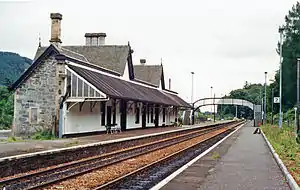Dunkeld & Birnam railway station
Dunkeld & Birnam railway station(Simply referred to as Dunkeld) serves the town of Dunkeld and village of Birnam in Perth and Kinross, Scotland. It is located on the Highland Main Line, 15 miles 31 chains (24.8 km) north of Perth and is the first stop on the line north of there, before Pitlochry.[4] Most services are operated by ScotRail, who also manage the station. LNER and Caledonian Sleeper also call some services here.
 | |
| General information | |
| Location | Dunkeld, Perth and Kinross Scotland |
| Coordinates | 56.5569°N 3.5783°W |
| Grid reference | NO030416 |
| Managed by | ScotRail |
| Platforms | 2 |
| Other information | |
| Station code | DKD[2] |
| Key dates | |
| 7 April 1856 | Opened |
| Passengers | |
| 2017/18 | |
| 2018/19 | |
| 2019/20 | |
| 2020/21 | |
| 2021/22 | |
Listed Building – Category A | |
| Designated | 5 October 1971 |
| Reference no. | LB11139[3] |
| Notes | |
Passenger statistics from the Office of Rail and Road | |
History
The station opened on 7 April 1856, as the terminus of the Perth and Dunkeld Railway from Stanley Junction (on the Scottish Midland Junction Railway).[5][6] Seven years later, it became a through station when the Inverness and Perth Junction Railway opened its line to Inverness via Pitlochry and Forres (the I&PJR had taken over the Perth & Dunkeld company that year - prior to this, the SMJR had worked the line).[7]
From 1863 to 1896 the station master was John Kinnaird.[8]
The station was host to a LMS caravan in 1935 and 1936 followed by two caravans from 1937 to 1939.[9]
The station was the last in Scotland to be lit by gas lights, these not being replaced by electric versions until the early 1980s. Although the trackbed has been raised following reballasting over the years, the platforms have not had similar treatment and are all considerably sub-standard in height. A couple of 'boxes' have been placed on both platforms to assist passengers to climb into the trains but, because the station is unstaffed, no assistance is available to move these aids into an appropriate position whenever a train arrives.
Facilities
The station has a small car park (and some bike racks), which gives step-free access to platform 1, which has a bench and a waiting shelter. There is no step-free access (access is via a footbridge) - nor any facilities - on platform 2.[10] As there are no facilities to purchase tickets, passengers must buy one in advance, or from the guard on the train.
Platform layout
The station has a passing loop 28 chains (560 m) long, flanked by two platforms. Platform 1 on the southbound line can accommodate trains having twelve coaches, but platform 2 on the northbound line can only hold ten.[11] When no crossing is to be made, northbound trains are usually routed through platform 1 which is signalled for bi-directional running.[12]
Services
As of May 2022, there are ten departures northbound to Inverness and eleven to Perth each weekday, with six trains going to Glasgow Queen Street and five to Edinburgh Waverley, including the Caledonian Sleeper service. On Sundays, there are 4 trains per day to Inverness (one of which extends to Elgin) and, southbound, four trains to Edinburgh Waverley (including the LNER Highland Chieftain service) and two to Glasgow Queen Street.[12]
| Preceding station | Following station | |||
|---|---|---|---|---|
| Perth | London North Eastern Railway Sunday, Southbound Only East Coast Main Line |
Pitlochry | ||
| Perth | ScotRail Highland Line |
Pitlochry | ||
| Perth | Caledonian Sleeper Highland Caledonian Sleeper |
Pitlochry | ||
| Historical railways | ||||
| Rohallion Line open; station closed |
Highland Railway Inverness and Perth Junction Railway |
Dalguise Line open; station closed | ||
References
- Brailsford 2017, Gaelic/English Station Index.
- Deaves, Phil. "Railway Codes". railwaycodes.org.uk. Retrieved 27 September 2022.
- Historic Environment Scotland. "Dunkeld and Birnam Station including footbridge (LB11139)". Retrieved 15 April 2019.
- Bridge, Mike, ed. (2017). TRACKatlas of Mainland Britain: A Comprehensive Geographic Atlas Showing the Rail Network of Great Britain (3rd ed.). Sheffield: Platform 5 Publishing Ltd. p. 91. ISBN 978 1909431 26 3.
- Quick 2022, p. 171.
- Thomas & Turnock 1989, p. 112.
- Grant 2017, p. 279.
- "Retirement of Dunkeld Stationmaster". Dundee Advertiser. Scotland. 17 December 1896. Retrieved 30 August 2017 – via British Newspaper Archive.
- McRae 1997, p. 22.
- "National Rail Enquiries -". www.nationalrail.co.uk. Retrieved 18 August 2022.
- Brailsford 2017, map 19A.
- eNRT May 2022 Edition, Table 213
Bibliography
- Brailsford, Martyn, ed. (December 2017) [1987]. "Gaelic/English Station Index". Railway Track Diagrams 1: Scotland & Isle of Man (6th ed.). Frome: Trackmaps. ISBN 978-0-9549866-9-8.
- Grant, Donald J. (2017). Directory of the Railway Companies of Great Britain (1st ed.). Kibworth Beauchamp, Leicestershire: Troubador Publishing Ltd. ISBN 978-1-78803-768-6.
- McRae, Andrew (1997). British Railway Camping Coach Holidays: The 1930s & British Railways (London Midland Region). Vol. Scenes from the Past: 30 (Part One). Foxline. ISBN 1-870119-48-7.
- Quick, Michael (2022) [2001]. Railway passenger stations in Great Britain: a chronology (PDF). version 5.04. Railway & Canal Historical Society. Archived from the original (PDF) on 25 November 2022.
- Thomas, John; Turnock, David (1989). A Regional History of the Railways of Great Britain. Vol. 15 The North of Scotland (1st ed.). Newton Abbott, Devon: David & Charles. ISBN 0-946537-03-8.